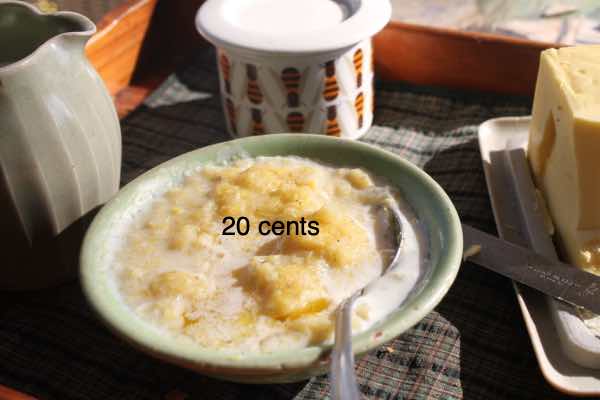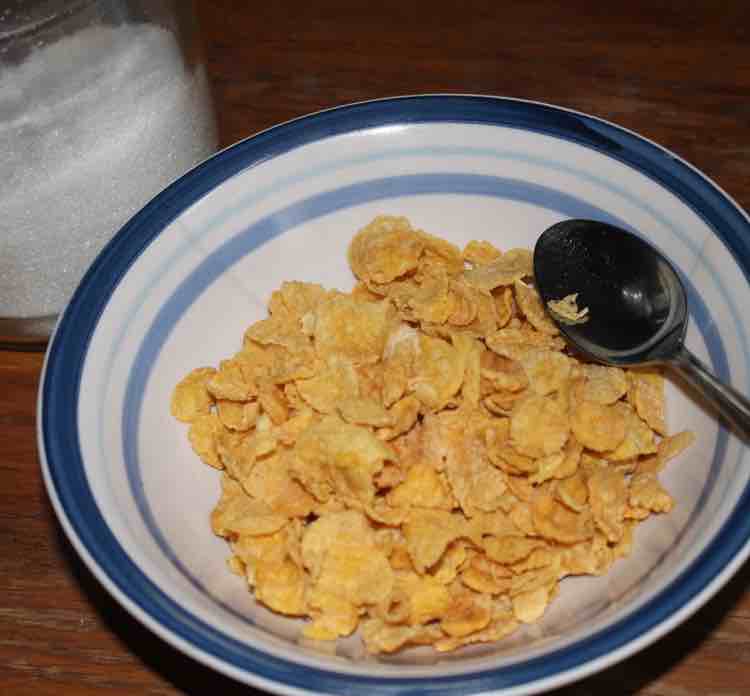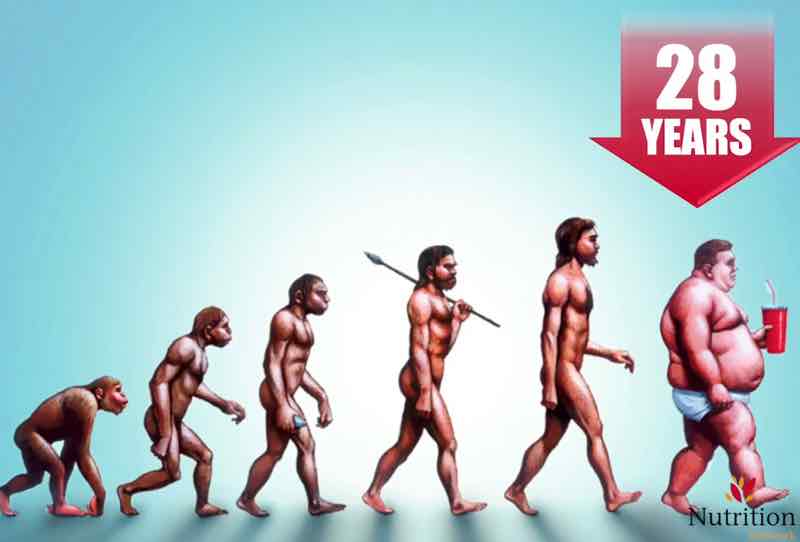- Homepage
- Our green kitchen
- Foods That Are Not Processed
Foods that are not processed
Foods that are not processed have had little of the goodness extracted; and are far tastier.
Let's take one simple example. As we all know cornflakes and grits made from refined maizemeal have little flavour; you have to spoon in a lot of sugar, honey or syrup. Already the manufacturer has added too much salt; 365 mg of sodium in a typical 50 gram helping[1].
A very generous helping of stone-milled grits, 400 grams of porridge, would cost about 20 South African cents; that a very measly US 1c.
Add a teaspoon of natural honey perhaps[2], a lump of butter and 1/5 cup milk; then it will be say US 3c.
Yet a most unsatisfying 50 gram helping of cornflakes from which most of the goodness has been extracted, would retail for about 350 cents in South Africa; a massive markup. The box costs the manufacturer more than the food inside.
In fact cornflakes is so refined, tasteless and high in salt that it is questionable whether it qualifies as food; it has an extremely high GI of 83.
 20c meal + 10c natural honey + 20c milk = 50 SA cents
20c meal + 10c natural honey + 20c milk = 50 SA centsFoods that are not processed have all the fibre, vitamins and minerals; and the important phytochemicals, fats and protein. Stone-ground grits is a true wholegrain. It is very tasty and extremely nutritious. It has a low GI; it's not fattening.
Food companies will try to deceive us by telling us that they have fortified the meal; having just extracted all the best parts.
SUMMARY
Cook sufficient stone-ground grits for say 4 days. Refrigeration allows the starch to "retrograde," lowering the GI even further[7].
Most breakfast cereals including cornflakes are categorised as ultra-processed foods.
"53% of those who consumed ultra-processed foods several times a day were distressed or were struggling with their mental well-being compared to 18 percent of those who rarely or never consumed UPFs[6]."
- Sapien Labs
Hard work initially
However I too do not wish to deceive you; it's hard work initially to get foods that are not processed. You may have to grow them yourself. Sourcing the grain is problematic.
Whole grain like that above is certainly not a convenience food; finding the unprocessed cornmeal is likely to be difficult and you may have to buy a mill. You have to cook it the night before, enough for several days and then allow it to retrograde in the fridge; and then reheat it in the morning.
So we cook enough for 4 or 5 days, keeping it refrigerated.
But then your large bowl of grits, including the natural honey and milk will cost only 50 South African cents. Divide by 20 to bring it to dollars; a mere pittance. With all the fibre it provides huge satiety.
"Processed foods are manufactured with minimal alterations from their
natural state, such as by adding salt, sugar or oil. Examples include
fruit preserved in syrup, vegetables preserved in vinegar or by
pickling; and grits with honey, cream and milk."
The industrialised diet
There is deep concern in the literature these days about what is being called the “industrialised diet.” Food that has been so processed that it often has little resemblance to the natural product from which it was made; to the extent that the original is now often very difficult to find.
Many examples come to mind; I’ll mention just a few.
- Pasture-fed beef, pork and dairy products
- Unprocessed natural sweetening
- 100% wholegrain meal
- Unprocessed breakfast cereals
- Organic fruit and veg
- Food grown without ecocides like Roundup
"Ultra Processed Foods like cornflakes are more durable, cheaper products. But they are often
nutrient-deficient; and high in calories, sugar and fat. Excess salt and a host of
additives like a flavour-enhancers have usually been added."
 Why were cornflakes invented?
Why were cornflakes invented?"Ultra Processed Foods are highly modified products created through industrial processes. They typically contain multiple additives, preservatives and artificial ingredients.
These foods built for long shelf lives include sugar-sweetened beverages, highly processed meat products and flavored yogurts; packaged snacks, breakfast cereals and commercial bread too."
There are two extreme views on the subject; and in between one that is largely ignored and sorely neglected.
Democratic right
The first is that we live in an open society where people supposedly have free choice. If they decide to vape themselves to death, snort cocaine and indulge in unprotected sex that is their democratic right. In principle the liberty to enjoy highly-processed food is little different. Government and in fact society as a whole should not interfere in any way.
Those who adhere to this view of freedom of choice would see nothing immoral about growing tobacco, distilling alcoholic beverages and extracting much of the goodness from farm products. The public is eagerly waiting to buy and may grumble but have little concern about the astronomic mark up in price. These companies are simply providing what the people want.
Ask any doctor and they will tell you that the quickest way to lose a patient is to tell them what they should not be eating.
"UPFs are industrially-produced edible substances that are imitations of food.”
- Carlos Montreiro, Brazilian researcher
Government must act
Then there is a second view that these things are unconscionable and it is society’s responsibility to intervene and protect citizens from exploitation. Prohibition of the sale of spirits, dagga and drugs is the duty of government. At the very least there should be punitive “sin taxes” on the sale of such products; as has just been applied to vaping.
Educating the public
And then lying between these two world views there lies a road less travelled; educating the public about the dangers of substance abuse, including all the so-called Ultra Processed Foods pertaining to the industrialised diet that are freely advertised and promoted.
So that no person can ever say they didn’t know about the dangers of eating stuff, I hesitate to call UPFs food; the nourishing parts have been extracted. And many chemicals, sugar and salt have been added to account for the loss of the natural flavour.
Political correctness lies at the centre of this dilemma. Educating the public means grasping many thorny nettles that society has been very reluctant to do; choosing rather to let people exercise their democratic rights despite the great dangers associated with these “unsafe practices.” The sacredness of the individual far surpasses the common good.
The great exception, one that I would suggest proves the rule, is on the subject of smoking. Fifty years ago nearly half of all adults smoked. As the dangers became more apparent finally government made the very unpopular decision to prohibit smoking indoors and to tax tobacco products heavily. Today less than 20% of people use tobacco; tens of millions of lives have been saved.
In sharp contrast, HIV infection has proved far too prickly an issue for society to grasp. Today the prevalence continues to rise with 20% of young and middle-aged adults in South Africa now being infected.
So too the obesity pandemic and attendant type 2 diabetes; it’s “fat bashing.” The unintended consequence of this freedom of choice is that nearly a half of all adults are now insulin resistant.

About 30 years after the recommendation to give up all animal fat and instead eat far more grains, the obesity pandemic began.
"The link between Ultra Processed Foods and obesity has been noted in several studies. Participants were randomized to either a UPF or minimally processed diet for 2 consecutive weeks and then switched.
During the UPF diet period they consumed approximately 500 more calories a day and gained around 2 lb."
The responsibility, one in which I would suggest society has been gravely amiss, lies equally with the Department of Health, educators and certainly every doctor; parents and the media too.
Just imagine if thirty years ago teachers, ministers of religion and radio announcers started the day with a statement to the effect that every person who sleeps around will become chronically ill, have to take toxic medicine for the rest of their lives and probably die long before their time.
How many of the three million South African victims of HIV who have died would still be alive? If each hour every TV station was obliged to give 30 seconds to a public service slot. The number of child-headed homes is terrifying. If it wasn’t for grannies, society would have collapsed.
The Human Immunodeficiency Virus is just as deadly as the bacteria that cause meningitis, TB and cholera; it just kills more slowly. There is no way around it; if HIV had been treated as a notifiable disease, with the same energy and transparency as Covid, millions of lives in South Africa would have been saved; it’s a deadly infection, not some holy cow.
Colorectal cancer
A 10% increase in proportion of UPFs was associated with 6% higher CRC risk.
Substitution of 10% of the overall proportion of the diet comprising UPFs or PFs with 10% unprocessed foods was associated with a decreased risk of CRC.
- International Journal of Cancer (February 2025)
The material expressed on this page is gleaned from the nutritional and environmental literature; it is clearly referenced. A plain distinction is made between the author's opinion and that which is scientifically proven. When in doubt consult your health professional.
To suggest a correction or clarification, write to Dr Bernard Preston here. Contact.
Who must pay?
The irritating philosophical question is who then should be responsible for picking up the tab when those who indulge in unsafe practices begin to succumb.
I have the right to smoke but who must cough up when I get cancer, emphysema or have a stroke?
I can indulge in sugary treats but who twenty years later must pay for the insulin? We can allow millers to extract the best part from our grains; but why then are we so surprised when 50% of children in many rural villages are permanently stunted and are unable to read, write and do basic arithmetic?
What has all this to do with Our Green Home, you may be asking? We have unequivocally chosen the road less travelled and we invite you to walk with us; it will make all the difference, perhaps only in ages hence[3].
Most South Africans have chosen the other road, the one more travelled with terrible consequences. We find ourselves amongst the ten most unhealthy countries in the world.
That will mean growing as much of your own fruit and veg as you can. And avoiding toxic chemicals in the water we drink, the air we breathe and in the food we eat; sleeping with just one partner.
It may mean pulling the sweet tooth[5]. Or keeping bees, natural unprocessed honey is the only source of sweetening that comes without consequences; and even that should be in limited amounts. Just this week the WHO has come out strongly against artificial sugars which lace so many foods pertaining to the industrial diet.
Your own chickens, rabbits and worm farms may come into the equation for the real nutters as we strive to enjoy long and healthy lives, free from disease and chronic medication.
The industrial diet is killing us; literally. Alas, something will get us all eventually. Now we see through a glass darkly; enough is known to make a start but much remains pure mystery.
Foods that are processed
Ultra-processed foods are defined as "ready to eat."
Or heat industrial formulations that are made with ingredients extracted from natural products; or synthesized in laboratories, with little or no whole foods in their composition.
They account for over 50% of those on typical grocery store meals.
- NOVA classification.
Scientists publishing in the American Journal of Preventative Medicine have found that for every 10 percent of UPFs that we consume there is a 2.7% increased risk of death from all causes.
Thus those eating typical grocery store food, consuming over a half of UPF meals have a 14% increased risk of all cause of death.
Of far greater concern though is not loss of lifespan but an ever greater increase in morbidity; years wracked with pain, disease and disability.
Foods that are not processed
Foods that are not processed are much cheaper and more wholesome.
When browsing use right click and "Open Link in New Tab" or you may get a bad gateway signal.
Newsletter
Our newsletter is entitled "create a cyan zone" at your home, preserving both yourself and Mother Earth for future generations; and the family too, of course. We promise not to spam you with daily emails promoting various products. You may get an occasional nudge to buy one of my books.
Here are the back issues.
- Lifestyle and ideal body weight
- What are ultra-processed foods?
- Investing in long-term health
- Diseases from plastic exposure
- Intensive lifestyle management for obesity has limited value
- A world largely devoid of Parkinson's Disease
- The impact of friendly bacteria in the tum on the prevention of cancer
- There's a hole in the bucket
- Everyone is talking about weight loss drugs
- Pull the sweet tooth
- If you suffer from heartburn plant a susu
- Refined maize meal and stunting
- Should agriculture and industry get priority for water and electricity?
- Nature is calling
- Mill your own flour
- Bake your own sourdough bread
- Microplastics from our water
- Alternative types of water storage
- Wear your clothes out
- Comfort foods
- Create a bee-friendly environment
- Go to bed slightly hungry
- Keep bees
- Blue zone folk are religious
- Reduce plastic waste
- Family is important
- What can go in compost?
- Grow broad beans for longevity
- Harvest and store sunshine
- Blue zone exercise
- Harvest and store your rainwater
- Create a cyan zone at your home
Did you find this page interesting? How about forwarding it to a friendly book or food junkie? Better still, a social media tick would help.
- Homepage
- Our green kitchen
- Foods That Are Not Processed
Address:
56 Groenekloof Rd,
Hilton, KZN
South Africa
Website:
https://www.bernard-preston.com